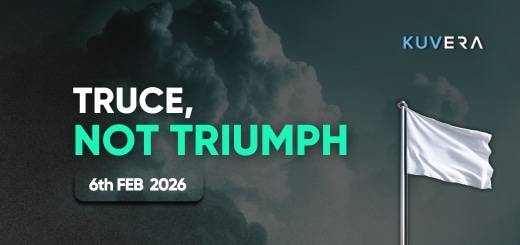In this edition, we talk about Donald Trump’s first few days in office and how his actions could affect India. We also talk about earnings reports of top companies, disputes between three groups of siblings, and SEBI’s latest move to popularise mutual funds.
Welcome to Kuvera’s weekly digest on the most critical developments related to business, finance, and the markets.
tl;dr Hear the article in brief instead?

Sometimes in life we face situations or events that are so tricky or overwhelming or challenging that we don’t really know what to do or what to say. What do we do in such situations?
It’s an idiotic question, no? Because we DON’T KNOW what to do!
But we will still attempt to answer the question. Here it is: Read the title. Huh, what!
Look at the title of this newsletter, silly. “Duck the Bouncer.”
Is it about how Sachin Tendulkar faced bouncers from Allan Donald and Shoaib Akhtar? Nope.
Is it about ducking the punches from Mike Tyson or Muhammad Ali? Nope.
Is it about ducking the bouncer who bars you from entering a bar or about a bouncer named Duck? Wrong again.
Giving up? Here’s what it is really about. Donald Duck.
Oh sorry, fat finger syndrome. We mean Donald Trump.
Trump took over as the 47th president of the United States on Jan. 20, and hurled one bouncer after another. And another. And another. And another.
He withdrew the US from the World Health Organization, the Paris climate agreement, and a global tax deal. He demanded that the US Federal Reserve, and central banks around the world, drop interest rates “immediately”.
He ordered higher oil production in the US—Drill, baby, drill, he says. He pushed companies to manufacture in America and warned of steep import tariffs on China, Mexico, Canada, and the European Union.
He cancelled citizenship at birth in the US and cracked down on immigration. He also threatened to take over the Panama Canal and Greenland, and renamed a sea and a mountain.
How does it matter to India? Thankfully, not all of it affects India. Not directly at least. But some of it does. Immigration, for instance, and tariffs. And their impact on foreign investments, stocks, the rupee, and interest rates.
Thousands of Indians go to the US every year, both legally and illegally. Some of those will now have to return. Others who were planning to go to the land of their dreams, may now rethink their plans. Media reports said several Indian families were rushing for C-section deliveries before Trump’s no-citizenship-at-birth order takes effect next month.
On H1B visas, a favourite route of Indian techies to go to the US, Trump has so far tried to strike a balance between his core supporters’ demand to curb it to create jobs for Americans and the wish of tech titans like Elon Musk to continue it.
Trade is another area of concern. India recorded a trade surplus of $36.8 billion with the US in FY24. Trump would want to shrink this gap.
While he hasn’t yet outlined what he wants from India, the US has earlier raised issues of high import tariffs on Harley Davidson bikes, medical devices, farm goods and dairy products. Media reports say India could cut some tariffs on agricultural goods, high-end medical equipment, and luxury bikes. But nothing has been decided yet.
So, how can the exporter, the techie, and the stock market investor handle Trump’s bouncers? Well, duck it!
Minimalist Choices
Moving back home, figuratively speaking, while the government machinery is going full throttle on preparing the budget that will be announced on February 1, India Inc is busy with the third-quarter earnings season.

Big IT companies and Reliance Industries have already announced their results, as we noted in our newsletter last week. This week, the companies that came out with their report cards included HDFC Bank, India’s biggest private-sector bank, and Hindustan Unilever, the largest maker of fast-moving consumer goods. And both weren’t very encouraging.
HDFC Bank’s standalone net profit inched up 2.2% to Rs 16,736 crore, matching analysts’ estimates. Net interest income rose 7.7% from a year earlier but net interest margin shrank sequentially and gross loans grew just 0.9%. Its gross non-performing assets ratio worsened to 1.42% from 1.36% and provisions for bad loans jumped 17% sequentially.
HUL’s net profit jumped 19% to Rs 2,989 crore but that was mainly because of a one-time gain on the sale of its Pureit water purifier business. Profit before exceptional items and tax increased only 0.2%. Revenue from operations grew only 1.6% to Rs 15,818 crore on price hikes as sales volume was flat and core profit margin shrank 20 basis points to 23.5%.
The company also noted that urban demand remains subdued and outweighed a revival in rural demand.
Apart from the earnings, HUL also announced its biggest acquisition in nearly six years. The company said it will acquire the skincare brand Minimalist at a valuation of Rs 2,955 crore.
While this is HUL’s biggest deal since it bought Glaxo’s consumer healthcare and Horlics business in an all-stock deal worth about Rs 31,700 crore, it won’t move the needle much since Minimalist reported revenue of just Rs 347 crore.
Still, it’s a step in the right direction as HUL shores up its brand portfolio and hopes for a revival in urban demand.
All in the Family

While most companies are worried about earnings and growth, some businesspeople have more pressing concerns—like ownership issues, the term that gained currency nearly two decades ago when billionaire Mukesh Ambani indicated for the first time all was not well between him and his brother Anil.
This week, another family dispute came to light when real estate tycoons Lodha brothers, who had parted ways in 2015, moved court over using the “Lodha” brand.
Macrotech Developers, headed by elder brother Abhishek Lodha, approached the Bombay High Court to stop younger brother Abhinandan Lodha from using the brand name under his business The House of Abhinandan Lodha.
Macrotech said The House of Abhinandan Lodha was “creating confusion” in consumers’ minds and that it was marketing its business in a manner which was “deceptively similar” to its own brand. Macrotech has even sought Rs 5,000 crore in damages for the trademark infringement, according to Business Standard.
On his part, Abhinandan Lodha has denied the allegations and says he, too, has the right to use the “Lodha” name.
The Lodhas aren’t the only siblings fighting over their businesses. The Kirloskar brothers Sanjay, Atul and Rahul, and Bharat Forge’s Baba Kalyani and his sister Sugandha Hiremath are locked in disputes, too.
Sanjay Kirloskar controls Kirloskar Brothers Ltd while Atul and Rahul Kirloskar run Kirloskar Oil Engines Ltd as part of a 2009 family settlement. Sanjay Kirloskar alleges that Atul and Rahul violated the family settlement when they entered a competing business—pumps—under the Kirloskar brand, which Kirloskar Brothers uses for its own pumps business.
We won’t go into the nitty-gritty of the dispute except that the brothers have knocked on several doors, from high courts to SEBI, the Securities Appellate Tribunal and even the Supreme Court.
As for Kalyani and his sister, the siblings are fighting over the ownership of pharmaceuticals and chemicals firm Hikal Ltd.
The dispute’s origin goes back to family agreements in the 1990s. The dispute took a new turn last week when Hikal said a Baba Kalyani company sent it a letter dated June 16, 2023 from N Vaghul, the former head of ICICI, in which he talks about a 1994 family meeting about Bharat Forge and Hikal’s shares.
In short, Kalyani claims there was never any settlement regarding Hikal’s shares. Hiremath says Kalyani raised “false and frivolous” allegations against her and that she wasn’t aware of the family wealth when the family business was divided. Hiremath also says Baba Kalyani continues to flout SEBI norms by not revealing the details of the family agreement.
All the disputes are far from over. So, stay tuned!
SIPs in Sachets
Switching to our main focus area of investing, the Securities and Exchange Board of India is going all out to draw more people into the markets and boost trading activity.
The capital markets regulator this week proposed that mutual fund houses roll out sachet-sized systematic investment plans (SIPs) starting at just Rs 250 with lower fees and simpler customer identification processes.
This will promote “financial inclusion, inculcate the habit of systematic saving and facilitate investment of small savings by investors new to the mutual fund space,” SEBI said in a consultation paper.
Will these small SIPs be commercially viable for the industry? SEBI noted that fund houses have agreed to offer lower rates for smaller SIPs and added that the investor education funds maintained by the industry can be used for the extra expenses. Moreover, each investor will be allowed to open only three such SIPs, SEBI proposed.
So, do you think the bite-sized SIPs will benefit investors? You can send your comments to SEBI by Feb. 6.
Separately, SEBI Chairperson Madhabi Puri Buch said this week that the regulator is looking to allow pre-listing trading. Essentially, this would allow investors to trade in shares of companies that have closed their initial public offerings but whose shares are not yet listed on the stock exchanges.
Currently, companies list their shares on the bourses three days after wrapping their IPOs. But even in those three days, there is a lot of trading on the grey market. “We feel that if investors want to do that, why not give them that opportunity in a proper, regulated way,” the SEBI chief said.
Market Wrap
India’s benchmark stock market indices ended lower for the third week in a row amid growing worries over slowing corporate earnings and uncertainty about Trump’s trade policies.
Both the BSE Sensex and the NSE Nifty fell almost 0.5% this week. Mid-cap stocks lost nearly 2.5% while the small-caps dropped over 4%.
Wipro was the top performer this week. It surged 13.5% after Q3 earnings exceeded expectations. Tech Mahindra, Infosys, TCS and HCL Tech also notched up gains. Other top gainers included Kotak Mahindra Bank, UltraTech, Britannia, Grasim, Tata Consumer and Eicher.
Tata Group retailer Trent, which more than doubled in 2024, was the biggest loser this week as its shares cracked 11.7%. Drugmaker Dr. Reddy’s Labs and SBI Life Insurance slumped about 6.5% each after missing quarterly earnings forecasts.
Adani Ports, Tata Motors, Reliance Industries, Axis Bank and Bharat Electronics were the other big losers.
Earnings Snapshot
- UltraTech consolidated net profit falls 17% to Rs 1,470 crore but exceeds expectations
- United Spirits Q3 profit jumps 36% to Rs 473 crore, tops analysts’ estimates
- Mankind Pharma consolidated net profit falls to Rs 380 crore from Rs 454 crore year ago, misses forecasts
- Mphasis consolidated net profit grows 15% to Rs 428 crore, beats estimates
- Dr Reddy’s Labs consolidated net profit up 2.5% at Rs 1,414 crore, miss analysts’ estimates
- Hindustan Petroleum standalone net profit soars sixfold to Rs 3,023 crore but misses forecasts
- Bharat Petroleum standalone net profit rises 37% to Rs 4,649 crore but lags forecasts
- Zee Entertainment profit jumps to Rs 164 crore from Rs 58.5 crore a year ago
- Fevicol maker Pidilite consolidated net profit up 9% at Rs 557 crore, lags analysts’ view
- ICICI Prudential Life Insurance profit surges 43% to Rs 326 crore
- Paytm Q3 loss narrows to Rs 204 crore from Q3 loss of Rs 407 crore, targets profit in 1-2 quarters
- Zomato net profit slumps 57% to Rs 59 crore, revenue soars 64% to Rs 5,405 crore
Other Headlines
- Kingfisher beer United Breweries to restart supply to Telangana on interim basis
- National Company Law Tribunal orders liquidation of budget airline Go First
- EPack Prefab Technologies, Karamtara Engineering, Gaudium IVF file DRHPs for IPO
- Dr Agarwal’s Health Care IPO to open on Jan. 29, sets price band at Rs 382-402 per share
- Construction material supply firm Infra.Market raises Rs 1,050 crore in pre-IPO funding
- Water purifier maker Kent R O Systems files draft red herring prospectus to launch IPO
- ThyssenKrupp-Mazagon Dock JV emerges as only contender for $5 billion submarine deal
- Indus Towers launches pilot electric-vehicle charging stations
- Central Consumer Protection Agency sends notice to Ola, Uber for differential pricing
- National Company Law Appellate Tribunal suspends data sharing ban between WhatsApp and its parent Meta
- Bharat Petroleum says to invest $121 million for developing Indonesian oil and gas block
- JSW Group to invest Rs 3 trillion in Maharashtra to expand presence in EVs, batteries, steel, and green energy
- Govt permits 1 million tons of sugar exports to support domestic prices
That’s all for this week. Until next week, happy investing!
Interested in how we think about the markets?
Read more: Zen And The Art Of Investing
Watch here: Investing in International Markets
Start investing through a platform that brings goal planning and investing to your fingertips. Visit kuvera.in to discover Direct Plans and Fixed Deposits and start investing today. #MutualFundSahiHai #KuveraSabseSahiHai












